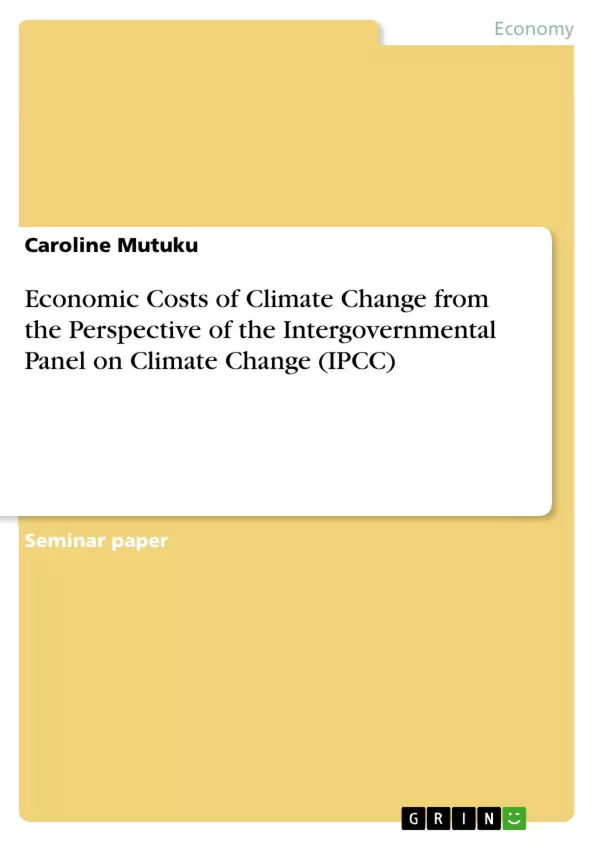Over the years, climate change has been observed to be a global challenge that requires global intervention. Therefore, the analysis of the obligations that are created by climate change has nowadays focused on the global and intergenerational distribution of climate change risks and responsibility for these risks, leading to the emergence of diverse organizations such as the Intergovernmental Panel on Climate Change (IPCC). IPCC is a United Nations body dealing with scientific as well as technical information provision on climate change, perceived impacts, and response options (an international body that assesses the science of climate change). The IPCC was officially constituted in November 1988, during its first meeting in Geneva, by the United Nations Environment Program (UNEP) and the World Meteorological Organization (WMO), to provide policymakers with regular climate change scientific assessments, current and future risks, and options for mitigation and adaptations. IPCC is responsible in assessing and reviewing diverse pieces of technical as well as scientific literature concerning climate change, using these materials to surface critical assessment climate change reports. As a result, climate policy makers in the member states use these reports to come up with solutions and strategies on climate change. Significantly, this paper aims at assessing the connection between the IPCC’s values and interests, its advocacy positions and use of science, alongside outlining my view on the IPCC’s views.
Inhaltsverzeichnis (Table of Contents)
- Introduction
- The Connection between the IPCC's Values and Interests
- The Connection between the IPCC's Advocacy Positions and Its Use of Science
- The Extent to which I Support the Views of the IPCC
- Conclusion
Zielsetzung und Themenschwerpunkte (Objectives and Key Themes)
This paper aims to analyze the Intergovernmental Panel on Climate Change (IPCC) by examining its values and interests, its advocacy positions, and its use of science. The paper will also offer the author's perspective on the IPCC's views.
- The IPCC's Values and Interests
- The IPCC's Advocacy Positions
- The IPCC's Use of Science
- The IPCC's Role in Climate Change Mitigation
- The Importance of International Cooperation
Zusammenfassung der Kapitel (Chapter Summaries)
- Introduction: This chapter provides an overview of the global challenge posed by climate change and the role of the Intergovernmental Panel on Climate Change (IPCC) in addressing it. It highlights the IPCC's mandate to provide scientific assessments on climate change and its impact, as well as to offer mitigation and adaptation options.
- The Connection between the IPCC's Values and Interests: This chapter explores the values and interests that guide the IPCC's work. It emphasizes the organization's commitment to objectivity, neutrality, transparency, and scientific rigor. It discusses the IPCC's role in collecting and assessing data on climate change, preparing comprehensive reports, and engaging with experts from around the world.
- The Connection between the IPCC's Advocacy Positions and Its Use of Science: This chapter examines the relationship between the IPCC's advocacy positions and its use of scientific data. It highlights the IPCC's advocacy for international cooperation in addressing climate change and its emphasis on the need for mitigation measures to reduce greenhouse gas emissions. The chapter also discusses the scientific methods and data employed by the IPCC in its assessments, including the use of technological measures and behavioral changes to limit global warming.
Schlüsselwörter (Keywords)
The paper focuses on the Intergovernmental Panel on Climate Change (IPCC), climate change, climate science, mitigation, adaptation, international cooperation, greenhouse gas emissions, scientific assessment, advocacy positions, and economic costs.
Frequently Asked Questions
What is the Intergovernmental Panel on Climate Change (IPCC)?
The IPCC is a United Nations body established in 1988 by UNEP and WMO. Its mission is to provide policymakers with regular scientific assessments on climate change, its risks, and options for adaptation and mitigation.
How does the IPCC use science in its reports?
The IPCC does not conduct its own research. Instead, it reviews and assesses thousands of peer-reviewed technical and scientific papers from around the world to create comprehensive assessment reports.
What are the core values of the IPCC?
The IPCC is committed to objectivity, neutrality, transparency, and scientific rigor. Its goal is to provide policy-relevant but not policy-prescriptive information.
What is the difference between mitigation and adaptation?
Mitigation involves actions to reduce or prevent greenhouse gas emissions to limit global warming. Adaptation refers to adjustments in ecological, social, or economic systems in response to actual or expected climatic stimuli.
Why is international cooperation vital for climate policy?
Climate change is a global challenge that transcends national borders. International cooperation, guided by IPCC assessments, ensures that risks and responsibilities are shared and that global strategies are effectively implemented.
- Citation du texte
- Caroline Mutuku (Auteur), 2018, Economic Costs of Climate Change from the Perspective of the Intergovernmental Panel on Climate Change (IPCC), Munich, GRIN Verlag, https://www.grin.com/document/429861



